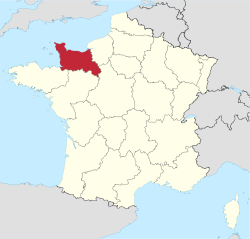Basse Normandie
|
Lower Normandy Basse-Normandie (in French) Basse-Normaundie (in Norman) |
||
|---|---|---|
|
||
 |
||
| Country | France | |
| Administrative region | Normandy | |
| Prefecture | Caen | |
| Departments | ||
| Area | ||
| • Total | 17,589 km2 (6,791 sq mi) | |
| Population (2007-01-01) | ||
| • Total | 1,453,000 | |
| ISO 3166 code | FR-P | |
| NUTS Region | FR2 | |
Lower Normandy (French: Basse-Normandie, IPA: [bas nɔr.mɑ̃.di]; Norman: Basse-Normaundie) is a former administrative region of France. On 1 January 2016, Lower and Upper Normandy merged becoming one region called Normandy.
The region included three departments, Calvados, Manche and Orne, that cover the part of Normandy traditionally termed "Lower Normandy" lying west of the Dives River, the Pays d'Auge (except a small part remaining in Upper Normandy), a small part of the Pays d'Ouche (the main part remaining in Upper Normandy), the Norman Perche, and part of the "French" Perche. It covers 10,857 km2, 3.2 percent of the surface area of France.
The traditional districts of Lower Normandy include the Cotentin Peninsula and La Hague, the Campagne de Caen, the Norman Bocage, the Bessin, and the Avranchin.
The traditional province of Normandy, with an integral history reaching back to the 10th century, was divided in 1956 into two regions: Lower Normandy and Upper Normandy.
During the Roman era, the region was divided into several different city-states. That of Vieux was excavated in the 17th century, revealing numerous structures and vestiges bearing testimony to the prosperity of the Caen region.
...
Wikipedia

